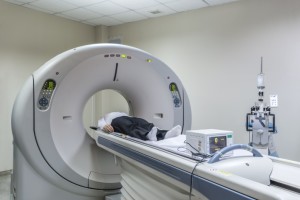Jump to:
Treatment Options
Surgery Types
Possible Risks
Post-Surgery Expectations
Treatments for Colorectal Cancer
There are generally three treatment options for colon and rectal cancer: surgery, chemotherapy and radiation.
Very early stage cancers that are localized in a polyp can sometimes be removed completely during a colonoscopy. In most cases, however, surgery is needed. Surgery can be performed through small incisions, either laparoscopically or with robotic assistance. Dr. Bilchik is trained and certified in advanced laparoscopic and robotic surgery.
Invasive colon cancer typically involves surgical removal of the tumor. This could involve the removal of part of the colon (colectomy) along with the marginal areas on either side of the cancer, or in extreme cases, the removal of the entire colon along with the rectum (proctocolectomy).
 Chemotherapy involves the use of drugs to destroy cancer cells. Patients with colon cancer may benefit from chemotherapy:
Chemotherapy involves the use of drugs to destroy cancer cells. Patients with colon cancer may benefit from chemotherapy:
- Preoperatively, to shrink the cancer
- After surgery, to help prevent cancer recurrence
- To relieve symptoms of colon cancer that has spread to other areas of the body
Radiation therapy uses energy sources such as X-rays to kill cancer cells. It may be used before surgery to make it easier to remove the cancer or after surgery to reduce the chance of cancer recurring.
 For advanced cancers Dr. Bilchik may also recommend targeted drug therapy in combination with chemotherapy.
For advanced cancers Dr. Bilchik may also recommend targeted drug therapy in combination with chemotherapy.
Dr. Bilchik understands that no two patients are the same, and he believes that every patient should be treated with dignity and compassion. He’ll work closely with you to find a personalized treatment plan that’s right for you.
Types of Colorectal Surgery
Many types of surgery are used to treat colorectal disorders. Today, procedures are often performed laparoscopically or robotically—minimally-invasive techniques that result in less pain, faster healing times, and smaller incisions.

Most surgeries to treat colorectal cancer, ulcerative colitis, Crohn’s disease, and diverticular disease involve the resection (cutting out) of the diseased portion of the intestine and the reattachment (anastomosis) of the cut ends of the intestine back together. Types of surgeries include:
- Segmental colon resection – removal of a segment of the colon depending on the location (right, transverse, left, sigmoid) of the tumor and the surrounding lymph nodes.
- Low anterior resection – removal of a segment of the rectum or the lower part of the sigmoid colon. The preferred approach for this operation is the Xi Davinci robotic surgery
- Abdominoperineal resection – treatment of anal and distal rectal cancers that are too low to preserve anal function; the rectum and part of the sigmoid colon are removed, and the end of the colon is brought through an opening in the abdominal wall (colostomy). However, every effort is made to preserve the anal sphincter rather than do an APR.
- Small bowel resection – removal of diseased portions of the small intestine affected by Crohn’s disease, rectal or colon cancer, polyps, ulcers, and benign tumors; the surgeon will either reattach the cut ends of the small intestine back together or create an opening to the outside of the body (an ostomy).
This is not an exhaustive list of colorectal surgery types—Dr. Bilchik will cover additional surgery types with you and will work closely with you to determine the best treatment approach for your particular situation.
Complications and Risks
As with any surgery, there are risks and potential complications with colorectal surgery, including infection, blood clots and pneumonia. Every effort is made to avoid these complications by walking and eating soon after surgery.
Dr. Bilchik will discuss all of the risks with you and provide you with medical counseling and guidance before and after surgery. He will closely monitor you to ensure you are adapting well to life after surgery.
What to Expect After Surgery
Most patients spend 1-5 days in the hospital. Open procedures typically require a 3-5 day hospital stay, while laparoscopic or robotic procedures have shorter hospital stays of 1-3 days. You can typically return home after the hospital staff has seen evidence of bowel function (flatulence or bowel movements), when you no longer require IV fluids, and when your pain is reasonably controlled.
Following a minor surgery, you may be able to return to work (depending on your profession) after just 2-4 days. Laparoscopic surgery has a 2-4 week recovery time, and open procedures have a 4-6 week recovery time. You should avoid heavy lifting and overexertion, after surgery, and follow a general rule: If it hurts, don’t do it.
Dr. Bilchik embraces a personalized approach to care and believes that every patient should be treated with dignity and compassion and should have access to the most current treatments available. Contact Dr. Bilchik’s office today, at (310) 449-5206, for a consultation.


